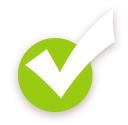Omaha
Omaha
Omaha is played the same way as Texas Hold’em, except that players have four pocket cards instead of two.
Object of the Game
From the player’s four individual (pocket) cards and the five community cards, use two pocket and three of the five community cards to make a five-card hand whose value is ranked higher than the hands of the other players.
Between two and ten players can play at the same Omaha table.
Cards
Omaha poker is played with a 52-card deck. The value of cards in decreasing order is Ace, King, Queen, Jack, 10, 9, 8, 7, 6, 5, 4, 3 and 2.
However, Aces can be used to make a Straight Flush or an Ace-2-3-4-5 Straight.
Combinations
The combinations in Omaha Poker are as follows, in order of decreasing rank:
- Royal flush
- Straight flush
- Four of a kind
- Full house
- Flush
- Straight
- Three of a kind
- Two pairs
- Pair
- High card
Click here to learn how to use the various combinations to make a poker hand.
The puck and the dealer
A marker, called the puck, is moved clockwise around the table one player position at a time as the game progresses, to determine the order of distribution of cards and the order during the betting rounds. When play begins, the puck is placed in front of the first active player next to the dealer, who is the equivalent of the traditional casino dealer.
Blind Bets
Before any cards are dealt, the first player next to the puck in clockwise order places the small blind bet. The next player in clockwise order then places the big blind bet. The actual amounts of the blind bets will vary in accordance with the type of limits of the table.
First Deal and First Betting Round
Starting with the first active player next to the puck, the dealer deals four face down cards one at a time to each player (the “pocket” cards). Once all players have received their four cards, the first betting round starts with the first player following the player who placed the big blind bet. In each betting round, as the situation permits, players have the following options:
Check: If no player has placed a bet, you can check, i.e. not bet but remain in the game.
Bet: Add a bet to the pot.
Call: Put the same bet into the pot as the previous player.
Raise: Place a higher bet than the previous player.
Fold: Not bet and lose the right of winning the pot (forfeit the game).
If no player has raised the big blind, the player who placed the big blind has the option of checking or raising.
The next betting round starts once all players remaining in the game have checked (whenever this choice is available) or have placed bets for the same amount.
The Flop and the Second Betting Round
The dealer burns the top card of the deck (which means it is dealt to the side and not used in play) then deals three community cards face up, called the Flop. The second betting round then begins with the first active player following the puck, with the same options as the first.
The Turn and the Third Betting Round
The dealer burns the top card of the deck then deals a fourth community card face up, called the Turn. A third betting round begins with the first active player following the puck, with the same options as before.
The River and the Fourth Betting Round
The dealer burns the top card of the deck and deals a fifth community card face up, called the River. A fourth and final betting round then begins with the first active player following the puck, with the same options as before.
The Showdown
After the fourth betting round, all the players who still have their four pocket cards make the highest possible five-card poker hand they can in order to win the pot, using two of their four pocket cards and three of the five community cards. The first player to show his cards is the player who bet or raised last. If no one bet in the previous round, the first active player next to the puck (in clockwise order) shows his cards first.
The Pot
The player with the highest ranked hand in the showdown or when all the other players have folded, wins and takes the pot. The pot is shared equally among players having identical winning hands. Wins from the pot are added to the winning player’s total stakes on the table. If the player is sitting at a cash game table, total stakes will automatically be paid into his or her Espacejeux account upon leaving the table.
Limits
Loto-Québec’s online gaming website offers you Omaha Limit and Pot Limit poker.




